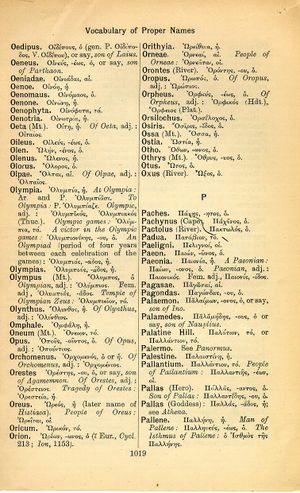Palaemon
Ὁ δὲ μὴ δυνάμενος κοινωνεῖν ἢ μηδὲν δεόμενος δι' αὐτάρκειαν οὐθὲν μέρος πόλεως, ὥστε ἢ θηρίον ἢ θεός → Whoever is incapable of associating, or has no need to because of self-sufficiency, is no part of a state; so he is either a beast or a god
English > Greek (Woodhouse)
Παλαίμων, -ονος, ὁ, or say, son of Ino.
Latin > English (Lewis & Short)
Pălaemon: ŏnis, m., = Παλαίμων.
I A sea-god, formerly called Melicerta, the son of Athamas and Ino: O Palaemon, sancte Neptuni comes, Plaut. Rud. 1, 2, 70; Cic. N. D. 3, 15, 39; Verg. A. 5, 823; Ov. M. 4, 542; id. H. 17, 159.—Hence,
B Pălae-mŏnĭus, a, um, of or belonging to the seagod Palœmon, poet. for Corinthian, Stat. Th. 2, 380: Palaemoniae coronae, won at the Isthmian games, which were celebrated in honor of Palœmon, Claud. Cons. Mall. Th. 289.—
II Remmius Palaemon, a Roman grammarian in the time of Tiberius and Claudius, Quint. 1, 4, 20; 1, 5, 60; Suet. Gram. 23; Juv. 6, 451; 7, 215; Pers. 2, 86.—
III A shepherd, Verg. E. 3, 50.
Latin > French (Gaffiot 2016)
Pălæmōn,¹³ ŏnis, m. (Παλαίμων), Palémon [fils d’Athamas et de Leucothoé, changé en dieu marin] : Cic. Nat. 3, 39 ; Virg. En. 5, 823 || Remmius Palémon [grammairien de Vicence, qui vécut à Rome sous Tibère et Claude] : Quint. 1, 4, 20 ; 1, 5, 60 ; Suet. Gramm. 23 ; Juv. 7, 215 ; 7, 219 || nom de berger : Virg. B. 3, 50.

